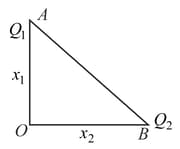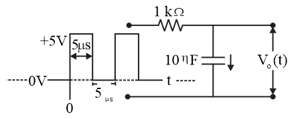MEDIUM
JEE Main
IMPORTANT
Earn 100
A capacitor is fully charged with voltage . After disconnecting the voltage source, it is connected in parallel with another uncharged capacitor of capacitance . The energy loss in the process after the charge is distributed between the two capacitors is :
(a)
(b)
(c)
(d)
16.67% studentsanswered this correctly

Important Questions on Electrostatics
MEDIUM
JEE Main
IMPORTANT
Two capacitors of capacitances and are charged to potential differences and , respectively. These are then connected in parallel in such a manner that the positive terminal of one is connected to the negative terminal of the other. The final energy of this configuration is :
MEDIUM
JEE Main
IMPORTANT
Ten charges are placed on the circumference of a circle of radius with constant angular separation between successive charges. Alternate charges have charge each, while have charge each. The potential V and the electric field E at the centre of the circle are respectively : (Take at infinity)
HARD
JEE Main
IMPORTANT
In the circuit shown, charge on the capacitor is :

MEDIUM
JEE Main
IMPORTANT
A parallel plate capacitor has plate of length , width and separation of plates is . It is connected to a battery of emf . A dielectric slab of the same thickness and of dielectric constant is being inserted between the plates of the capacitor. At what length of the slab inside plates, will the energy stored in the capacitor be two times the initial energy stored?
EASY
JEE Main
IMPORTANT
Charges and are at points and of a right-angled triangle . The resultant electric field at point is perpendicular to the hypotenuse, then is proportional to:

MEDIUM
JEE Main
IMPORTANT
For the given input voltage waveform the output voltage waveform across the capacitor is correctly depicted by :

MEDIUM
JEE Main
IMPORTANT
Suppose that intensity of a laser is The rms electric field, in units of associated with this source is close to the nearest integer is
MEDIUM
JEE Main
IMPORTANT
Two identical electric point dipoles have dipole have dipole moments and and are held on the -axis at distance '' from each other. When released, they move along the -axis with the direction of their dipole moments remaining unchanged. If the mass of each dipole is '', their speed when they are infinitely far apart is :
